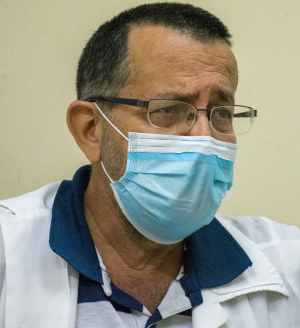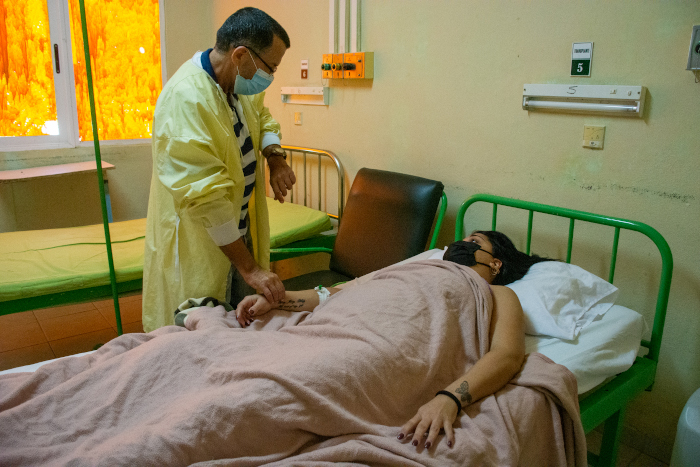CAMAGÜEY.- Obstructive nephropathy is the structural or functional damage of the kidneys that is caused by the difficulty in urine outflow due to an element that can cause obstruction and it is a disease that has repercussions on the kidney. If it is unilateral, it affects only one and if it is bilateral, it affects both.
Thus began our medical consultation with Dr. Leonardo Curbelo Rodríguez, 2nd degree specialist in Nephrology, Master in Medical Emergencies, Assistant Professor and Assistant Researcher, who works at the Nephrology Center, a service attached to the Manuel Ascunce Domenceh University Hospital of this city, to which he added: There are those who speak of obstructive uropathy, and this would be something similar, but still without damaging the function of the kidney, nor in its structure. When its function is compromised, it is referred to as obstructive nephropathy.
—What would the symptoms be?
—It can be from being asymptomatic or with very mild symptoms and the person does not give it importance or attributes them to other conditions. Low back pain appears and they think it is from the spine and many times it is not acute; however, it is light and sustained with a sense of thoughtfulness at that level. On other occasions the pain is intense and is called renal colic, accompanied by vomiting, abdominal distension and this pain radiates to the legs and in the case of men to the testicles, and in this case it is acute and intense so forces the patient to go to the doctor.
Another symptom is bloody urine, hematuria, which can be microscopic or macroscopic. In the first case it is detected in the urinalysis and in the second, the affected person observes it when urinating.
It can also cause frequent urinary tract infections and if this occurs, obstruction must be ruled out, especially if you are a man.
Arterial hypertension is another warning to take into account, more so if it is accompanied by the aforementioned pains, or the urine is cloudy (dark or whitish), and if there are alterations in the urine stream, it is another sign because the person notices that is weak, bifurcated, has the sensation of wanting to continue urinating or has to push excessively, if he feels burning when urinating, or gets up several times at night to do so and this happens because the affected person does not empty the bladder completely and it has that residual urine left so the time comes when it is full again. All this indicates that something is wrong and it is important to know it.
—Do these obstructions always behave the same?
—No, they can be total, partial, acute and chronic.
In the case of the total, the patient does not urinate at all; in the partials he continues to urinate and does not notice that he is obstructed; it can be installed acutely, which is when it happens at the moment; and the chronic appears progressively.
And we have the so-called high and low, depending on whether it involves the urethra, the bladder, the ureters, and the kidneys. In the discharge it has to be bilateral so that they compromise both kidneys and the discharge generally does link both.
—How would the affected person go to see a specialist?
—You can go to your family doctor and he or she will guide you because this ailment belongs to the urology specialist, this is the kidney surgeon, and he is the one who has to correct the condition by surgery early to avoid further damage.
 —From your vast experience, does the patient arrive in time to have his ailment corrected?
—From your vast experience, does the patient arrive in time to have his ailment corrected?
—There are more who have not been treated early.
—What role does the nephrologist play?
—The nephrologist is the kidney clinician and when they come to us it is because that organ is already damaged, so I hope they never have to come to us.
—What are the most common causes of the disease?
—Kidney stones (lithiasis), those that people call stones that form in the urinary tract and that can be produced from the renal calyces, the pelvis, the ureter, and even in the bladder and generally form from an initial core where the salts are grouped and precipitated and each time the stones are larger.
Also prostate problems, such as: benign prostatic hyperplasia, especially when the affected person is over 45 years old. Elderly men are often late to the doctor because they hide the symptoms, so kidney damage is already evident. Prostate cancer looks the same and it is more complicated. In both cases, treatments are indicated, but they are different.
Bladder tumors constitute another cause, more so in patients who are smokers, alcoholics, and they appear in men more than in women, as well as due to the sequelae of sexually transmitted diseases, while gynecological tumors can cause this type of obstruction in them, especially due to cervical cancer, without forgetting that there are other reasons, such as: stenosis (narrowing) of the urethra, even more so in multiparous women, or those facing instrumental deliveries.
There are other causes due to infections, and vesicoureteral reflux (VUR), this is the abnormal flow of urine that goes back from the bladder through the ducts (ureters) that connect the kidneys with the bladder, and despite the fact that it is not an obstruction, it behaves as such because the one that returns gets in the way of the one that comes from above, this can damage the kidney.
—You mentioned smoking and alcohol. Are there other toxic habits or bad behaviors that influence obstructive nephropathy?
—In kidney stones we find one of the most frequent causes of obstruction, I insist, and many times they are favored by the diet. Excess salt, meat foods, coffee, black tea, calcium. The same happens with waters rich in salts and not drinking enough liquid.
—Could it be a hereditary disease?
-Yes. Diseases due to polycystic and medullary cystic effects of the kidney.
—Are there medications that can cause the disease?
-Indeed. Levodopa and those containing sulfa, of course, in high doses or very long treatments, so medical monitoring is required and never change without consultation the schemes indicated by the professional.
—Do people give the required importance to their kidney stones?
-Unfortunately not. It is more common for them to remember their kidney stones when they suffer a pain crisis and that is a way of losing the kidney because the kidney stone produces not only obstruction but also chronic inflammation of the renal parenchyma (cortex and medulla of the kidney), for thus it can lead to other complications and chronic kidney disease. Therefore, it is important to know that these kidney stones must be treated and what it is recommended is to try to resolve them through medical, surgical, interventional or combined treatment, depending on the specialist's criteria and the technology available.
—When the obstruction is installed can it be reversed?
—Depends on the causes. If there is an inoperable malignant tumor, it is not possible, but there is a way to eliminate the obstruction, which if it is low, may be resolved with a bladder catheter, if it is high, a nephrostomy must be performed, which is a catheter placed through the abdomen, and that is how they are other derivations used.
—You have alluded to ages and sex, anything else about it?
—Kidney stones are more common in men and in younger ages, that is, from 20 to 60 years. When it comes to tumors, the opposite happens, it is seen more in those who are over 60 years old. At an early age, in children, they occur due to congenital malformations that lead to this condition, and some are already detected before birth.
—What would their treatment be like?
—It is potentially treatable in early stages and can prevent reaching chronic renal failure.
—What are the complications of obstructive nephropathy?
—When one or both kidneys are obstructed, they can cause, in addition to the symptoms described, acute damage to the kidneys, with high creatinine levels and not infrequently with the need for dialysis, usually this is seen when the obstruction is acute and total because the kidney is damaged quickly, in a matter of weeks or days, and if these patients are not corrected quickly, they can be left with chronic deterioration and then they would be dependent on dialysis forever, this indicates that if you act quickly, the obstruction can be reversed ., and sometimes this is partial, it does not resolve completely, even though at the moment you do not have to use dialysis.
Chronic renal failure is the other complication, the one that leaves the kidney damaged and requires, depending on the case, dialysis, hemodialysis or a transplant, all according to the patient's age and medical criteria, always knowing that to be transplanted before the obstruction must be surgically intervened, otherwise it would harm him the grafted kidney and, furthermore, continuing to be obstructed would lead to infections.
—A piece of advice?
—Be attentive to the symptoms and go to the doctor early, in this way the disease would be preventable in many cases, and they would even not have to come to our nephrology consultations.
Translated by Linet Acuña Quilez



